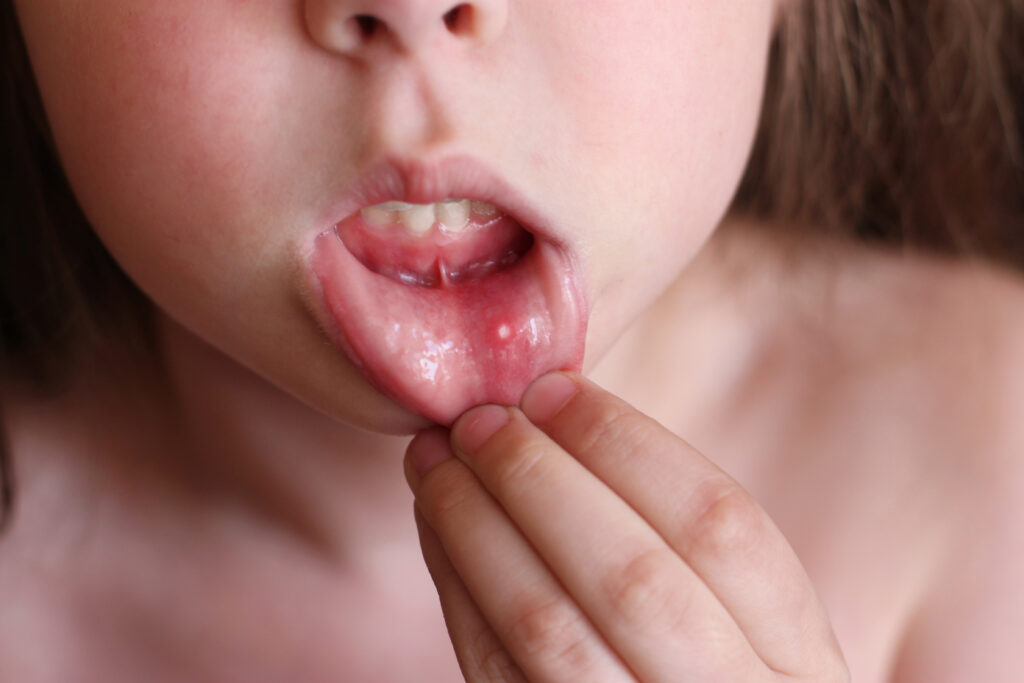
Around 1 in 10 people have canker sores from time to time. These shallow sores appear in the lining of your mouth. While they’re not contagious, they can be irritating and even painful. Canker sores start as white or yellowish with a red border. They may be tiny initially, but they can grow up to one inch in diameter. You might get canker sores on the roof of your mouth, lips, or gums, and even under your tongue.
Canker sores can be simple or complex. Simple canker sores last up to a week, and you might experience them three to four times a year. Complex canker sores are larger and more painful, can last up to one month, and may leave a scar. Teens and people in their 20s are more likely to get simple canker sores, with women being more prone to developing them than men. Because these sores are not associated with bacterial or viral infections, you can’t spread them to another person. However, they can cause discomfort for days or weeks when you eat or talk.
Symptoms and Causes of Canker Sores
Canker sores are not the same thing as cold sores. Cold sores, which are infectious, generally appear outside the lips. In contrast, canker sores cannot spread to other people, and they appear inside your mouth. Doctors sometimes call canker sores “mouth ulcers” or “aphthous ulcers.”
The symptoms of a canker sore might include a tingling or burning sensation in your mouth. You’ll see a small white, yellow, or gray sore with a red border. Severe cases can involve swollen lymph nodes, fever, and general fatigue.
Although experts don’t know why some people are more prone to simple canker sores, they have found certain factors that increase the likelihood of developing them:
- Stress
- Acidic foods
- Braces and other dental appliances
- Injury to your mouth
Complex canker sores tend to occur in people with immune system issues, such as Crohn’s disease, AIDS, and celiac disease.
Vitamin deficiencies may also cause canker sores. People with low iron, zinc, folic acid, and vitamin B12 levels are more likely to develop them.
Hormonal changes also affect how likely you are to get canker sores. Scientists believe the condition may have a genetic component since being more prone to developing canker sores tends to run in families.
Diagnosing and Treating Canker Sores
A physical exam is usually all your doctor needs to diagnose a canker sore. If they’re unsure what the cause of the canker sore is, they may recommend getting a blood test to ensure you don’t have nutritional deficiencies.
Some of the most common treatment options for canker sores are over-the-counter or prescription medications.
Topical anesthetics like benzocaine can help with discomfort, while mouth rinses that contain hydrogen peroxide, dexamethasone, or beclomethasone can help keep the sores clean.
Corticosteroids, especially ointments, can also help. Antibiotics like doxycycline might be necessary to treat recurrent canker sores.
If the cause of the sores is a nutritional deficiency, your doctor can tell you what supplements to take or what foods to add to your diet.
While your canker sores heal, you want to avoid foods that can irritate your mouth’s lining even more. It’s best to avoid acidic, salty, and spicy foods, as well as hard, crusty bread and alcohol.
Can You Prevent Canker Sores?
You can help prevent canker sores by maintaining good oral hygiene. Brushing after every meal and flossing at least once a day can remove food particles that might irritate the lining of your mouth.
Make sure you add foods or supplements to your diet that address deficiencies. And since stress is a common cause of canker sores, turning to relaxation techniques might be a solution. Try meditation, guided imagery exercises, and breathing exercises to see which can offer the results you want.
If you have braces or other dental appliances, ask your orthodontist about waxes that can cover any edges that rub against your mouth.
Knowing When to Turn to Professionals
If you have recurrent canker sores that last for weeks at a time or are very painful, the best thing you can do is get help from experts. Your doctor will discuss the steps you can take to help the canker sores heal. They may also prescribe medications or recommend over-the-counter solutions.
By knowing what causes your canker sores and having someone guide you on how to care for the lining of your mouth, you can better manage the sores when they appear.
Resource Links:
- “Canker sores (mouth ulcers): Overview” via National Library of Medicine
- “The Treatment of Current Recurrent Oral Aphthous Ulcers” via National Library of Medicine
- “Genetic factors in the etiology of mouth ulcers” via National Library of Medicine
- “Canker sores (mouth ulcers): What can you do if you have a canker sore?” via National Library of Medicine





